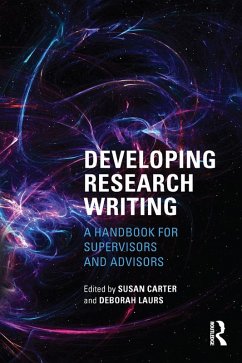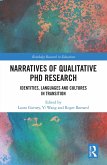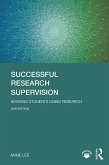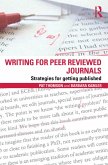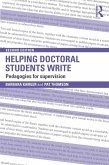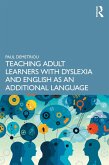Book parts are framed by empirical supervisor and doctoral student experiences and chapters within each part provide multiple approaches. The carefully chosen contributors are specialists on research writing and doctoral pedagogy, who guide the reader through the key stages of providing feedback. Split into nine key parts the book covers:
- starting a new supervision with writing in focus;
- making use of other resources along the way;
- encouraging style through control of language;
- writing feedback on English as an Additional Language (EAL) writing;
- Master's and Honours smaller projects' writing feedback;
- thesis by publication or performance-based writing;
- maintaining and gathering momentum;
- keeping the examiner happy;
- writing feedback as nudging through identity transition.
The parts cohere into a go-to handbook for developing the supervision process. Drawing on research, literature and experience, Developing Research Writing offers well-theorized, yet practical and grounded advice conducive to good practices.
Dieser Download kann aus rechtlichen Gründen nur mit Rechnungsadresse in A, B, BG, CY, CZ, D, DK, EW, E, FIN, F, GR, HR, H, IRL, I, LT, L, LR, M, NL, PL, P, R, S, SLO, SK ausgeliefert werden.
Overall I believe this book proposal has merit. The editors - particularly Susan Carter - and many of the contributors are well known within certain circles within Australian and New Zealand and - to a lesser extent - UK. However, the inclusion of Anthony Pare may lead to interest in Canada and Pat Thomson may lead to greater interest in the UK.
Terry D Evans Emeritus Professor at Deakin University
The editors are very experienced at this sort of editorial work on doctoral processes and have earned international reputations for their efforts. A major strength is that the topic is enduring and important. Given the ways that supervisory preparation and development is undertaken in universities, it is debatable whether a specific book would be in broad demand; it is more likely that specific chapters would be copied and used for supervisor workshops, courses etc.
Overall I believe this book proposal has merit. The editors - particularly Susan Carter - and many of the contributors are well known within certain circles within Australian and New Zealand and - to a lesser extent - UK. However, the inclusion of Anthony Pare may lead to interest in Canada and Pat Thomson may lead to greater interest in the UK.
Terry D Evans Emeritus Professor at Deakin University
The editors are very experienced at this sort of editorial work on doctoral processes and have earned international reputations for their efforts. A major strength is that the topic is enduring and important. Given the ways that supervisory preparation and development is undertaken in universities, it is debatable whether a specific book would be in broad demand; it is more likely that specific chapters would be copied and used for supervisor workshops, courses etc.

